The Youth and the Future of AI conference welcomed over 700 registrations in a lively discussion moderated by Andrew Jack, Global Education Editor, Financial Times. Panelists included: Nupur Kohli, Supervisory Board member Unicef Netherlands, Shalin Jyotishi, Fellow in AI, World Economic Forum, Senior Policy Analyst at New America, and GHFutures2030 Regional Youth Champion, Njide Ndili, Country Director Pharm Access and GHFutures2030 Commissioner, and David Walcott, Founder Novamed and World Economic Forum Futures Council member. The panel convened intergenerational perspectives on how youth drive the future of health tech and the need to include youth in shaping the digital transformation in health.
“It was important for the Commission to enfranchise youth and to ensure their ideas were captured to ultimately help conceptualize the future of health”, said Njide Ndili.
This new approach in working with youth throughout the Commission was important because youth experience different scenarios in terms of connectivity and use of digital tech. The Commission’s report highlights the need to take these different experiences into account when thinking about health governance and the future of health.
The partnering document to the Commission report which helped inform the Commission’s deliberations was the GHFutures2030 Youth Statement and Call for Action, developed by 35 youth from 21 different countries. Youth called for strong and inclusive health governance; a human rights-based approach to health; and the need to foster digital skills, education, and innovation for health futures.
Collaboration is key in driving digital inclusion with youth and coordinating these movements is just as important. Regional Youth Champion, Shalin Jytoshi urged for a better balance of global collective action with local rallying because there are many opportunities for youth to connect and address shared challenges at this level.
“Proven ‘public interest technology’ tools like co-design and participatory technology assessments should be used to give youth agency in co-creating their digital health future”, said Jytoshi.
An interesting case study in Jamaica on how youth rallied for local impact through stronger implementation of policy was shared by Wolcott
“Youth hold a significant role in driving impact and activism at the local level”, urged David Walcott.
A youth call for action that was created and shared with over 250 young people in 24 hours led to a series of 150 projects and 1 million dollars raised to support implementation at the local level.UNICEF is a partner of the Commission who works to connect local youth to global movements including the UReport. Nupur Kohli discussed the need for high quality data to find inequities in health outcomes and identify unmet needs for youth.
“Improving accurate data and strong information systems to advance healthcare for children and youth are important”, said Kohli.
Another example raised during the panel was the World Economic Forum’s project of generation AI. It has three pillars: empower young people to use tech, educate them to use tech, and protect them from harms to health. Countries and companies need to be transparent about the effects of products on the health of youth. Gamification however does have potential for driving the health of youth, but being cognisant of how we can empower, protect, and educate youth lies at the core of such initiatives.
“Young people should be the advocate for the responsible use of tech that is the key for better health futures”, encouraged Kohli.
Including youth in the digital transformation is at the core of improved health futures. Capacity building was chosen most frequently by participants in answering the question of how to better include youth in the digital transformation of health.
Panelists further emphasized the importance of access to technology, mentorship for youth when it comes to driving digital solutions and health tech, and the need to use digital fluency of many youths nowadays in creating solutions that are designed with youth in mind.
“Lived experiences ARE expertise and youth are experts of their own experiences”, concluded Jyotishi. The Commission’s report was published on 24 October 2021 alongside the youth statement + call for action. These documents can be found here.
Recording to be shared on publication View
Medical Doctor and Advisor, Supervisory Board Member Unicef Netherlands, Advisory Council Member World Economic Forum Global Shapers and Health Lead AI Future Lab
-
This author does not have any more posts.

